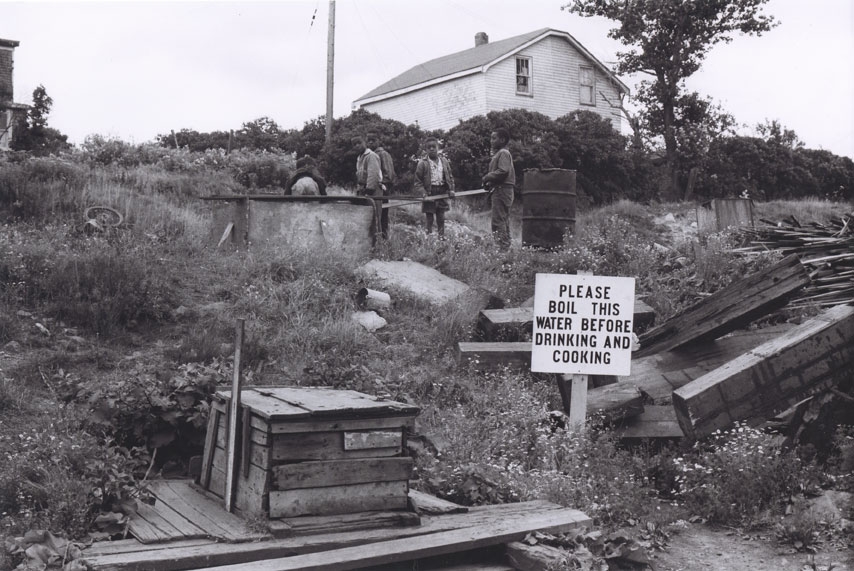
Africville (Canadian Encyclopedia)
This column originally appeared in the Halifax Examiner on October 10, 2017.
On Sept. 25, the United Nations Human Rights Council discussed a report on Canada by its Working Group of Experts on Peoples of African Descent. The report, which shone its white-hot light on our country’s sordid history of slavery and racism in virtually every sphere of life — from education to justice to the environment — called on Ottawa to not only apologize for the sins of our forefathers but also consider paying reparations for them.
Last week, the African Nova Scotian Decade of African Descent Coalition, a local group made up of 25 black community organizations who’d met the experts during their visit to Canada last year, weighed in with its own response. As Lynn Jones, the local chair of the Global African Congress, put it: it is past time for us to address society’s “crime against humanity.” The coalition not only welcomed the report’s findings — the UN report had reserved its harshest criticism for Nova Scotia — but it also outlined a series of related recommendations of its own, including legally recognizing African Nova Scotians as a “distinct group” and calling on the government to “work with African Nova Scotians to consider reparations in a Nova Scotia context.”
Even that couched, cautious call to consider reparations generated a predictable almost rote why-me response from many white Nova Scotians. I happened to catch part of a segment on the issue on Rich Howe’s News 95.7 talk radio show. If I could summarize what I heard, it would be this: I wasn’t around when slavery existed and I’m not responsible for it, so why should I have to pay reparations. The past is past, things are better now, so let’s just move on…
It’s a comforting argument, but it pre-supposes we, as whites, haven’t benefited from centuries of slavery and racism, or that our black fellow citizens aren’t still suffering its effects. It also assumes the economic, educational, judicial and social scales are now in perfect colour-blind balance.
Neither notion is correct.
Start with the history of slavery and racism. There were slaves in Nova Scotia even before Halifax’s founding. In 1750, 400 of the city’s 3,000 residents — more than 13 per cent — were slaves. Successive waves of white settlers — old stock New England planters and British loyalists among them — brought their slaves with them to Nova Scotia.
Even the so-called freed slaves who arrived in the province after the American revolution were assigned the worst, rockiest land and then — insult to injury — not even given clear title to it. (In response to the UN report, which also highlighted that issue, the provincial government announced last week it would — belatedly — provide $2.7 million to help residents of five predominantly black communities clear title to their land, a grievance that now dates back centuries.)
Slavery may have been legally abolished in 1834, but the treatment of blacks did not suddenly or even eventually improve. The UN report, for example, calls the late 1960s razing of Africville a “dark period,” and points to an ongoing history of locating landfills next door to predominantly black communities as a form of “environmental racism.”
While noting that African Nova Scotians have demonstrated “resistance and resilience” in the face of such obstacles, the Toronto Star points out:
“The report draws a through-line between Canada’s history of racial segregation to the structural racism that ‘lies at the core’ of many Canadian institutions today, manifesting itself in the form of poverty, health problems, low educational attainment, higher rates of unemployment and overrepresentation of black Canadians in the criminal justice system.”
Why is it, for example, that the number of blacks in federal prisons increased by more than 71 per cent in the decade between 2005 and 2015?
Or how do we explain the fact, as Afua Cooper, the James R. Johnston Chair in Black Canadian Studies at Dalhousie University, told PRIDE, Canada’s daily African Canadian and Caribbean Magazine: “Our kids are over-represented in children’s aid, school dropout [rates], and yet no one seems to think we have a problem.”
Or how about the finding of a 2016 provincial report that showed black students were one-and-a-half times more likely to be shunted into “individual program plans” — the contemporary version of streaming that pushes kids out of university-prep courses — than their white counterparts. Worse, according to the report, close to 4 in 10 of those black students were inappropriately categorized into IPPs.
While many whites seem to consider racism an historical artifact, even the most conventionally successful members of that community would beg to differ. African Nova Scotian Affairs Minister Tony Ince’s reaction to the UN report, for example: “Not surprised at all… This report just basically highlights what most of the community is already aware of.” And Wanda Thomas Bernard, an African Nova Scotian senator, told Global TV the report “captured the essence of the anti-black racism that we see here in Nova Scotia and in Canada.”
That disconnect between white and black views of reality on this issue is not surprising, but it is troubling.
We in the white community need to come to terms with the reality we have a racism problem — still — before we can hope to change it. Finally.
Correction: In an earlier version of this post, I suggested Wanda Thomas Bernard is “Canada’s first African Nova Scotian senator.” She is not. The first was Senator Donald Oliver, followed by Senator Calvin Ruck. My apologies to all.





 STEPHEN KIMBER, a Professor of Journalism at the University of King's College in Halifax and co-founder of its MFA in Creative Nonfiction Program, is an award-winning writer, editor and broadcaster. He is the author of two novels and eight non-fiction books. Buy his books
STEPHEN KIMBER, a Professor of Journalism at the University of King's College in Halifax and co-founder of its MFA in Creative Nonfiction Program, is an award-winning writer, editor and broadcaster. He is the author of two novels and eight non-fiction books. Buy his books